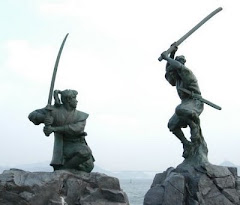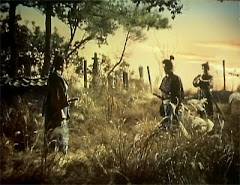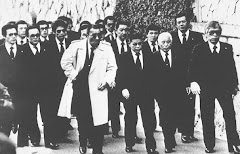Whereas Japanese school boards may choose textbooks that gloss over WWII (their loss), there is nothing stopping the publication of a book strongly criticizing Japanese leaders or Japanese conduct in China. I’ve never seen a Chinese textbook, but I’d imagine that they tend to completely misrepresent the 20th century – by the command of Beijing. What’s more, no criticism of its leadership is tolerated in the publication industry at all. As the latest example, Mao: The Unknown Story has been banned in China (mentioned at the bottom of the article).
Reading the article, you can almost piece together the missing verses from the song “Imagine”
Imagine no food
No tableware or pots and pans
Nothing to masticate or digest
Except the tree bark and grass
Or the flesh of your neighbor….
Okay, I’m no songwriter, but you get the idea.
Monday, October 31, 2005
Friday, October 28, 2005
Kerry still hasn't found his voice on the war
Tim Blair noticed a Kerry-ism in an email the senator sent out to his supporters about his then upcoming “major Iraq” speech:
Blair: Pretentious blowhard. If “achieving what needs to be achieved in Iraq” is key, how does one avoid the requirement to “stay for as long as it takes”?
Indeed. And his speech? (excerpts here) Well, he likes to talk about asking the hard questions, but never seems to get around to the hard questions. When he finally drones his way to the "plan" portion of his argument - he provides absolutely nothing useful. He thinks there should be a political solution between the Sunnis and Shia - yet, he refuses to acknowlege that that's what all the constitution business is about. He thinks we need to build up Iraqi security, but refuses to acknowlege that that's what the U.S. has been doing. In short, any good ideas that he has are already in motion. And the meat of his plan? for Bush to provide a ....plan:
Not only is that not a plan, but it's just a bad idea. Bush's timelines are right on - transfer authority here, elect a temporary government here, develop a constitution here, etc. Those timelines are good to make known. They keep the wheel turning. That's the plan that Kerry is too blind to see. His timelines are geared towards withdrawal. Personally, I'd like to see no mention of pulling troops out - even when it is happening. If we cut our troop levels in half, best not to even acknowlege that we did it until years later. Hold those cards close to the vest. As Iraqis stand up, we'll stand down - that's as specific as you should get.
Later today, I will deliver a major speech on the war in Iraq.
It asks a hard and essential question: how do we bring our troops
home within a reasonable and responsible timeframe, while achieving what needs
to be achieved in Iraq?
One thing is certain. It isn’t by continuing to pursue the Bush
administration’s “stay for as long as it takes” rhetoric.
Blair: Pretentious blowhard. If “achieving what needs to be achieved in Iraq” is key, how does one avoid the requirement to “stay for as long as it takes”?
Indeed. And his speech? (excerpts here) Well, he likes to talk about asking the hard questions, but never seems to get around to the hard questions. When he finally drones his way to the "plan" portion of his argument - he provides absolutely nothing useful. He thinks there should be a political solution between the Sunnis and Shia - yet, he refuses to acknowlege that that's what all the constitution business is about. He thinks we need to build up Iraqi security, but refuses to acknowlege that that's what the U.S. has been doing. In short, any good ideas that he has are already in motion. And the meat of his plan? for Bush to provide a ....plan:
"The Administration must immediately give Congress and the American people a
detailed plan for the transfer of military and police responsibilities on a
sector by sector basis to Iraqis so the majority of our combat forces can be
withdrawn. No more shell games, no more false reports of progress, but specific
and measurable goals."
Not only is that not a plan, but it's just a bad idea. Bush's timelines are right on - transfer authority here, elect a temporary government here, develop a constitution here, etc. Those timelines are good to make known. They keep the wheel turning. That's the plan that Kerry is too blind to see. His timelines are geared towards withdrawal. Personally, I'd like to see no mention of pulling troops out - even when it is happening. If we cut our troop levels in half, best not to even acknowlege that we did it until years later. Hold those cards close to the vest. As Iraqis stand up, we'll stand down - that's as specific as you should get.
Thursday, October 27, 2005
Ugh! Miers withdraws.
I was in the pro-Miers camp and thought she should at least get her hearings. The split among conservatives was, for the most part, a healthy thing, though I fail to see how her withdrawal benefits anybody, especially Bush. You’d think his record on judicial appointees would have earned some trust. Oh, well. Throughout the debate, I thought Hugh Hewitt was exceptional in his defense of Miers. He took on pretty much everyone (including what seemed like the entire NRO staff) and bested them one by one. Too bad he wasn’t on the winning side. Apparently, the anti-Miers portion of the base will not be happy unless Bush breaks out the pole and feeds the Democrats an uber conservative nominee like a Chinese man feeds a duck. I’m prepared to support that, too. I only hope the jelly-kneed Senate is.
Wednesday, October 26, 2005
Straddling the fence
"Clinton said she doesn't support a deadline for withdrawing troops from Iraq nor
does she support leaving our troops there for an open-ended period."
Sounds like a Democrat.
French treachery?
Here's a month old story about the forged Niger documents claiming that they were apparently deliberately manufactured at the behest of the French government to derail the arguments for the war.
"Italian diplomats have claimed that, by disseminating bogus documents
stating that Iraq was trying to buy low-grade "yellowcake" uranium from
Niger, France was trying to "set up" Britain and America in the hope that
when the mistake was revealed it would undermine the case for war, which it
wanted to prevent."
And yet the pith of the 16 words remains firm.
Tuesday, October 25, 2005
Another pro-American leader gets reelected
this time in Poland. When the big picture looks bright, you can weather all the nasty little bumps along the way.
Congratulations to the Iraqis for passing their constitution!
Meanwhile, the left has the champagne on ice, waiting to celebrate 2,000 dead or Fitzmas - whichever presents itself first.
Monday, October 24, 2005
Saturday, October 22, 2005
Chinese hysteria
A recent opinion piece on the Peoples Daily Online, entitled How can Koizumi Win Trust from World? expresses how bent out of shape the Chinese are over the Prime Minister’s fifth trip to the Yakusuni shrine:
This 5 Point Plan should not be confused with Jintao’s 5 Point Plan aimed at improving relations with Thailand, or the 5 Point Plan on how to handle the Middle East, or the 5 Point Plan to improve relations with India or the 4 Point Plan in dealing with Taiwan. Was that last plan missing a Point? Indeed it was, but not to worry, there was also a 5 Point anti-secession law that was passed this year and another 5 Point proposal for relations between the KMT and the People’s government. That’s 14 Points towards Taiwan alone, if you’re keeping score. But those aren’t freedom leaning Wilsonian points. One might assume that Hu’s 5 Points issue resolution schematic extends to other areas as well:
5 Point Strategy to oppressing religious minorities,
5 Point Strategy to establishing an obedient press,
5 Point Strategy to defending Tinnamen Square from freedom,
maybe you could throw in…
5 Point Strategy to increasing fireworks production in elementary school factories,
or, closer to the boudoir….
4 Point Strategy to pleasing Mrs. Hu (the fifth point banned by the one child policy).
If Hu were to team up with a big name publisher, his 5 Point strategies could replace all the 8 Step strategies currently in the Diplomatic self-help section of your local Borders.
Adopting a numerically consistent method to solve issues is fine, in itself. The unavoidable generic and vague types of steps like “…economic and trade cooperation should be expanded” say little, but may help keep the eye on the ball. Yet, it hardly represents a great vision forward. And when you don’t respect those basic generic principles in the first place, it fails to mean anything at all. Going back to Japan, check out Hu’s 5 Points:
In the first point, China believes that both parties should respect previous agreements (here, here and here) in order to look forward. In the second point, China shucks away the the idea of looking to the future expressed in the first point and starts dwelling on the past. History is a mirror, alright, but only when it concerns Japan, it seems – never China. When China urges Japan to “action” in backing up it’s “remorse”, it means reparations, yet the Joint Communique, one of Hu’s cited agreements, explicity states:
Oh, well. China is more concerned in holding Japan accountable to the People's interpretation of agreements Japan made with the KMT regarding Taiwan than it is about holding itself accountable for it’s own direct agreements made when it was the negiotiating party of China. For it’s own part, Japan has kept the agreements it made to the KMT and honored them with the communists.
With almost all the agreements betweent the two countries, China plays fast and loose with the proclaimed spirit of the negotiations while Japan follows that spirit as closely as possible while maintaining its right of sovereignty. Consider some more of these points alluded to in the agreements cited in Hu’s 5 Points:
from the 1972 communique –
What imperial ambitions have the Japanese expressed or taken action to achieve since 1945? None. Yet, China has gobbled up Tibet, initiated a border war with Vietnam, built up massive military resources geared toward an invasion of Taiwan and poured a million troops into the Korean penninsula to ensure that it was either communist or divided. And it appears that China will be prone to future sable rattling, if not military action, over the Sino-Russo border. It’s obvious that Imperial China, thirsty for land and resources, is alive and well and seeking Asian hegemony.
From the 1998 Declaration:
Believe it or not, there was a brief moment in history when China acknowleged Japanese economic benevolence:
And as an aside, Japan did keep it’s commitment to China and the latter is currently a WTO nation.
Continuing with the 5 Point Plan:
Yet, Point 2 denies Japan that equal ground.
How does the People’s government stoke those fires? Well, how about the official Chinese claim that Japan is responsible for 38 million deaths in China? No prudent method of estimation could get anywhere close to that number. The actual damage caused by the Japanese occupation is bad, there’s no need to exaggerate it. Yet, the Chinese completely neglect the hardships it inflicted on itself through not only the sixty plus years of civil strife before 1949. To them, one big pile of Chinses bodies is one big pile and it’s better to blame it all on the Japanese than take any responsibility for it. And that’s not to mention the monumental damage caused Mao, himself, since the People’s Party has been in power. To this day China maintains a record of oppression, whether it’s cracking down on democratic movements or just good old fashion religious persecution. When the government’s official position is based on crap information, then it’s not a surprising to see misguided assumptions like the one made in that recent People’s editorial:
The editorial relies on misinformation throughout – just as the People’s diplomacy relies on its own insincerity:
When you’re dealing with such sensitivity, you can’t expect rational negotiations.
The truth is that the Chinese can forever say “no” to Japan. Is Japan obligated to listen? The only time that the Chinese citizen is not allowed to say “no” is when it comes to disagreeing with his own government.
The editorial concludes:
Despite the strong opposition from China and other Asian countries and their peoples as well as from the people of insight in Japan, Koizumi provoked disturbances and randomly hurt the feelings and dignity of the victimized countries and their peoples during the war and seriously undermined Sino-Japanese relations. The move evokes great indignation in Chinese people.
This year marks the 60th anniversary of the victory in China's War of Resistance against Japanese Aggression and the World Anti-Fascist War. Such a move challenges the human conscience and international justice.
In April this year, Chinese President Hu Jintao put forward a five-point proposal on the Sino-Japanese relations at the Asian-African summit. Koizumi's action ignored the sincere wishes of the Chinese government and people for improving the Sino-Japanese ties...
This 5 Point Plan should not be confused with Jintao’s 5 Point Plan aimed at improving relations with Thailand, or the 5 Point Plan on how to handle the Middle East, or the 5 Point Plan to improve relations with India or the 4 Point Plan in dealing with Taiwan. Was that last plan missing a Point? Indeed it was, but not to worry, there was also a 5 Point anti-secession law that was passed this year and another 5 Point proposal for relations between the KMT and the People’s government. That’s 14 Points towards Taiwan alone, if you’re keeping score. But those aren’t freedom leaning Wilsonian points. One might assume that Hu’s 5 Points issue resolution schematic extends to other areas as well:
5 Point Strategy to oppressing religious minorities,
5 Point Strategy to establishing an obedient press,
5 Point Strategy to defending Tinnamen Square from freedom,
maybe you could throw in…
5 Point Strategy to increasing fireworks production in elementary school factories,
or, closer to the boudoir….
4 Point Strategy to pleasing Mrs. Hu (the fifth point banned by the one child policy).
If Hu were to team up with a big name publisher, his 5 Point strategies could replace all the 8 Step strategies currently in the Diplomatic self-help section of your local Borders.
Adopting a numerically consistent method to solve issues is fine, in itself. The unavoidable generic and vague types of steps like “…economic and trade cooperation should be expanded” say little, but may help keep the eye on the ball. Yet, it hardly represents a great vision forward. And when you don’t respect those basic generic principles in the first place, it fails to mean anything at all. Going back to Japan, check out Hu’s 5 Points:
First, friendly and co-operative Sino-Japanese relations orientated towards the 21st century should be developed on the basis of the three political documents, namely, the Sino-Japanese Joint Statement, the Sino-Japanese Treaty of Peace and Friendship and the Sino-Japanese Joint Declaration.
Second, the issue of history should be taken seriously by adhering to the principle of "taking history as a mirror and looking forward to the future." Japan should back up its remorse on wartime aggression with action and deal with historical issues in a serious and prudent manner.
In the first point, China believes that both parties should respect previous agreements (here, here and here) in order to look forward. In the second point, China shucks away the the idea of looking to the future expressed in the first point and starts dwelling on the past. History is a mirror, alright, but only when it concerns Japan, it seems – never China. When China urges Japan to “action” in backing up it’s “remorse”, it means reparations, yet the Joint Communique, one of Hu’s cited agreements, explicity states:
5. The Government of the People's Republic of China declares that in the interest of the friendship between the Chinese and the Japanese peoples, it renounces its demand for war reparation from Japan.
Oh, well. China is more concerned in holding Japan accountable to the People's interpretation of agreements Japan made with the KMT regarding Taiwan than it is about holding itself accountable for it’s own direct agreements made when it was the negiotiating party of China. For it’s own part, Japan has kept the agreements it made to the KMT and honored them with the communists.
With almost all the agreements betweent the two countries, China plays fast and loose with the proclaimed spirit of the negotiations while Japan follows that spirit as closely as possible while maintaining its right of sovereignty. Consider some more of these points alluded to in the agreements cited in Hu’s 5 Points:
from the 1972 communique –
“Neither of the two countries should seek hegemony in the Asia-Pacific region and each is opposed to efforts by any other country or group of countries to establish such hegemony.”
What imperial ambitions have the Japanese expressed or taken action to achieve since 1945? None. Yet, China has gobbled up Tibet, initiated a border war with Vietnam, built up massive military resources geared toward an invasion of Taiwan and poured a million troops into the Korean penninsula to ensure that it was either communist or divided. And it appears that China will be prone to future sable rattling, if not military action, over the Sino-Russo border. It’s obvious that Imperial China, thirsty for land and resources, is alive and well and seeking Asian hegemony.
From the 1998 Declaration:
Both sides express support for the reforms of the United Nations including the reform of the Security Council, in order for the United Nations to further embody the common wish and collective will of all Members in its activities and policy decision making process.Yet China is vehemently opposed to letting the second largest economy joining that same Security Council. And any reform of the Security Council that might do something about places like Sudan and Iran has been stiff armed by China.
Both sides stress the importance of the ultimate elimination of nuclear weapons, and oppose the proliferation of nuclear weapons in any form whatsoever, and furthermore, strongly call upon the nations concerned to cease all nuclear testing and nuclear arms race, in order to contribute to the peace and stability of the Asian region and the world.Well, not quite, when it comes to China. The People’s government is not very concerned with N. Korean nuclear capabilities, unless it will mean nuclear bombs in S. Korea, Japan or [gasp] Taiwan. When or if Japan resorts to attaining nuclear weapons, it will not be because of an imperial quest, but to ensure its defense.
Believe it or not, there was a brief moment in history when China acknowleged Japanese economic benevolence:
The Chinese side expressed its gratitude for the economic cooperation extended by Japan to China. The Japanese side reiterated that it will continue to support China's efforts for the early accession to the WTO.
And as an aside, Japan did keep it’s commitment to China and the latter is currently a WTO nation.
Continuing with the 5 Point Plan:
Third, the Taiwan question should be handled properly.To China, this means repeated threats of invasion backed by hundreds of missiles pointed at the small islands as well as military simulations of an amphibious assault. To Japan, it means recognizing the one China solution where the two entities (Taiwain and China) can willing and peacefully unite, and in that light, Japan will help defend the island from a mainland invasion until peaceful and mutual reunification can occur.
Fourth, the differences between China and Japan should be dealt with through dialogue and negotiation on equal ground.
Yet, Point 2 denies Japan that equal ground.
Lastly, friendly non-governmental exchanges and co-operation should be further enhanced to strengthen mutual understanding, expand common interests and develop a healthy bilateral relationship.Which apparently allows China to stoke the anti-Japanese fire so fully that Japanese students in China cannot be guaranteed of personal safety from angry mobs and Japanese businesses (and even businesses perceived to be Japaneses) face the possibility of damage and looting during the all to common anti-Japanese protests.
How does the People’s government stoke those fires? Well, how about the official Chinese claim that Japan is responsible for 38 million deaths in China? No prudent method of estimation could get anywhere close to that number. The actual damage caused by the Japanese occupation is bad, there’s no need to exaggerate it. Yet, the Chinese completely neglect the hardships it inflicted on itself through not only the sixty plus years of civil strife before 1949. To them, one big pile of Chinses bodies is one big pile and it’s better to blame it all on the Japanese than take any responsibility for it. And that’s not to mention the monumental damage caused Mao, himself, since the People’s Party has been in power. To this day China maintains a record of oppression, whether it’s cracking down on democratic movements or just good old fashion religious persecution. When the government’s official position is based on crap information, then it’s not a surprising to see misguided assumptions like the one made in that recent People’s editorial:
The Japanese militarism hurt the Chinese people the most in the modern history.Especially, if the editorialist has a state provided portrait of Moa glaring down at him. A reasonable man can only concede to that statement under the threat of torture. Otherwise, it is misleading and serves absolutely no purpose in strenthening “mutual understanding, expand common interests…” with Japan.
The editorial relies on misinformation throughout – just as the People’s diplomacy relies on its own insincerity:
The Osaka High Court made a ruling recently that Koizumi's visit to Yasukuni violated Japanese constitution and Koizumi's visit made light of the law.Not mentioned is that Koizumi made the visit as a private Japanese citizen and not as a public official, which is what the weak kneed Osaka High Court objected to in it’s statement. Perhaps Koizumi might propose ceasing his personal visits to the shrine if the People’s government would agree to putting up a memorial honoring the dead students at Tinnamen Square. On second thought, that would violate “the principles of mutual respect for sovereignty and territorial integrity” set forth in the Joint Communique. One would think that same principle of sovereignty would allow Koizumi to go where he pleased on Japanese soil, so long as he wasn’t stirring up Japanese hostility towards China. But no, such action by Koizumi “evokes great indignation in Chinese people..” and presumably threatens the future relations between the two contries. After all, as the editorial points out, the day Koizumi paid tribute at the shrine “was a day when the Chinese people warmly congratulated the successful landing of China's manned Shenzhou VI. So his action is a serious provocation against the entire Chinese people.”
When you’re dealing with such sensitivity, you can’t expect rational negotiations.
Why do the Chinese people, whose feelings were seriously hurt, cannot say no?
The truth is that the Chinese can forever say “no” to Japan. Is Japan obligated to listen? The only time that the Chinese citizen is not allowed to say “no” is when it comes to disagreeing with his own government.
The editorial concludes:
Just think, how does a country, that has no rational knowledge and correct attitude towards its own aggressive history and war crimes, win trust from the world, and the leader of the country goes his own way and ignores human moral principles? If really wanting to win confidence from its Asian neighboring nations and the international community and playing an active role inJapan has shown without a shadow of a doubt that it is a responsible benevolent country. Its textbooks may gloss over its imperialist past, but its actions in the last 60 years indicate that it has learned the lessons of its crimes. China has not. It continues to violate any expression it has made towards creating a peaceful and prosperous region. Perhaps Hu has a 5 Point Plan to fix that.
international affairs, Japan must take compelling actual actions to show that it "has history as lessons and faces the future''
Thursday, October 20, 2005
Wednesday, October 19, 2005
Misunderestimating Bush: take 32,457
What will the giddy columnists and lefty bloggers do if Rove and Libby don't get 22 indictments today? I'm guessing that they will easily deceive themselves into thinking that the two were indicted and found guilty and sentenced to the pokey. After all, the left's powers of self deception are remarkably advanced. Take Dan Simpson. He thinks we're losing in Iraq, that inflation is out of control and that the bird flu has pretty much doomed us all. And he still gets paid for his opinions! If only he was alone in those beliefs. Here he is talking about the perceived motives of a Syrian invasion:
The Bush administration would claim that it is expanding the war in Iraq into Syria to try to bring it to an end, the kind of screwy non-logic that kept us in Vietnam for a decade and cost 58,193 American lives in the end.
Others [Dan Simpson perhaps?] would see the attacks in Syria as a desperation political move on the part of an administration with its back against the wall, with a failed war, an economy plagued by inflation --1.2 percent in September, a 14.4 percent annual rate if it continues -- the weak response to Hurricane Katrina, grand jury and other investigatory attention to senior executive and legislative officials, and the bird flu flapping its wings toward us on the horizon. The idea, I suppose, is to distract us by an attack on Syria, now specifically targeted by U.S. Ambassador to Iraq Zalmay Khalilzad.
Of course, such an invasion would never have anything to do with winning the War on Terror. Why, that's just too absurd to even consider. Mr. Simpson even believes that the current state of Iraq is worse for Israel than when Saddam was hiding missile programs and cutting checks to the families of Palestinian self whackers:
Could anyone argue that Israel is made safer by a burning conflict in Iraq that has now attracted Islamic extremist fighters from across the Middle East, Europe and Asia? Saddam Hussein's regime was bad, but this is a good deal worse, and looks endless.
By this description, one might get the idea that Simpson sees the insurrection as made up largely of outsiders trying to destroy the U.S. mission in Iraq. But just wait until he has to crap on the president from another direction - he'll completely ignore that role of outsiders to paint the "insurrection" as a native germ because all Iraqis are against the U.S. Whatever fits the moment.
In regards to our options in Syria, I believe David Ignatius is orbiting a little closer to earth in his column:
An angry Bush administration, meanwhile, was actively exploring a policy of regime change several months ago. Bush was furious at Assad for not controlling the insurgents who are using Syria as a base for their attacks on U.S. troops in Iraq, and the president pressed his national security team to explore whether there were good alternatives to Assad.
But the administration pulled back from its regime-change enthusiasm in recent weeks, and officials now speak of the need for "policy" change. A big factor is the new director of national intelligence, John Negroponte, and his analysts at the National Intelligence Council. They have been warning Bush that if Assad is toppled, the result isn't likely to be better in terms of regional stability, and it could well be worse.
I don't know how accurate that is - whether that's what Negroponte is saying or whether he's right if he is saying it. But when it comes to invading Syria, I would put money on Bush mulling over security concerns and not just running cover for other perceived disasters.
The Bush administration would claim that it is expanding the war in Iraq into Syria to try to bring it to an end, the kind of screwy non-logic that kept us in Vietnam for a decade and cost 58,193 American lives in the end.
Others [Dan Simpson perhaps?] would see the attacks in Syria as a desperation political move on the part of an administration with its back against the wall, with a failed war, an economy plagued by inflation --1.2 percent in September, a 14.4 percent annual rate if it continues -- the weak response to Hurricane Katrina, grand jury and other investigatory attention to senior executive and legislative officials, and the bird flu flapping its wings toward us on the horizon. The idea, I suppose, is to distract us by an attack on Syria, now specifically targeted by U.S. Ambassador to Iraq Zalmay Khalilzad.
Of course, such an invasion would never have anything to do with winning the War on Terror. Why, that's just too absurd to even consider. Mr. Simpson even believes that the current state of Iraq is worse for Israel than when Saddam was hiding missile programs and cutting checks to the families of Palestinian self whackers:
Could anyone argue that Israel is made safer by a burning conflict in Iraq that has now attracted Islamic extremist fighters from across the Middle East, Europe and Asia? Saddam Hussein's regime was bad, but this is a good deal worse, and looks endless.
By this description, one might get the idea that Simpson sees the insurrection as made up largely of outsiders trying to destroy the U.S. mission in Iraq. But just wait until he has to crap on the president from another direction - he'll completely ignore that role of outsiders to paint the "insurrection" as a native germ because all Iraqis are against the U.S. Whatever fits the moment.
In regards to our options in Syria, I believe David Ignatius is orbiting a little closer to earth in his column:
An angry Bush administration, meanwhile, was actively exploring a policy of regime change several months ago. Bush was furious at Assad for not controlling the insurgents who are using Syria as a base for their attacks on U.S. troops in Iraq, and the president pressed his national security team to explore whether there were good alternatives to Assad.
But the administration pulled back from its regime-change enthusiasm in recent weeks, and officials now speak of the need for "policy" change. A big factor is the new director of national intelligence, John Negroponte, and his analysts at the National Intelligence Council. They have been warning Bush that if Assad is toppled, the result isn't likely to be better in terms of regional stability, and it could well be worse.
I don't know how accurate that is - whether that's what Negroponte is saying or whether he's right if he is saying it. But when it comes to invading Syria, I would put money on Bush mulling over security concerns and not just running cover for other perceived disasters.
Rumsfeld urges openness and democracy in China
Will it make a dent? Probably not, but it's the kind of stuff the Chinese people need to hear. His comments to a group of Chinese students:
"Every society has to be vigilant against another type of great wall that can be a burden on man's talents and is borne from fear of them -- a wall that limits speech, information or choices..."
"While there is no model that is perfect for every nation at every time in its development, a look across the globe suggests that societies that tend to encourage more open markets and freer systems are societies where people are enjoying the greatest opportunities..."
"Every society has to be vigilant against another type of great wall that can be a burden on man's talents and is borne from fear of them -- a wall that limits speech, information or choices..."
"While there is no model that is perfect for every nation at every time in its development, a look across the globe suggests that societies that tend to encourage more open markets and freer systems are societies where people are enjoying the greatest opportunities..."
Tuesday, October 18, 2005
If Ronnie Earle is on a mission from God
you'd think God might help him provide some evidence. Unless the mission is for Earle to make an ass of himself.
Steyn on Smurfistan
I hadn't seen the Unicef video, but I'm surprised that they apparently omitted the Smurf rape rooms and the mass graves and beheading videos. From Steyn:
Good luck to Unicef and all. But I can't help thinking that, if you are that concerned for children in war zones, you might have done something closer to what real conflict is like in those places. In Rwanda, Sudan and a big chunk of west Africa, air strikes are few and far between. Instead,
millions get hacked to death by machetes. Even on the very borders of Eutopia, hundreds of thousands died in the Balkans in mostly low-tech, non-state-of-the-art ways.
In 2003, Charles Onyango-Obbo wrote a fascinating column in the East African musing on the resurgence of cannibalism, after reports that Ugandan-backed rebels in the Congo were making surviving members of their victims' families eat the body parts of their loved ones.
"While colonialism is bad," he said, "the coloniser who arrives by plane, vehicle or ship is better - because he will have to build an airport, road or harbour - than the one who, like the Ugandan army, arrived and withdrew from most of eastern Congo on foot." Just so. If you're going to be attacked, it's best to be attacked by a relatively advanced enemy. Compared to being force-fed Grandfather Smurf's genitals, having his village strafed in some clinical air strike is about the least worst option for Baby Smurf.
Monday, October 17, 2005
The non-issue that won't go away
It is the "sensitive" year according to Hu Jintao, so Koizumi shouldn't be so darned insenstive. Actually, this issue can be easily remedied. All Hu has to do is order Google and Yahoo to filter out any mention of Koizumi's visit to the shrine and the Chinese can pretend like it never happened.
Meanwhile, the Japanese face certain threats that they shouldn't ignore. And they are not.
Meanwhile, the Japanese face certain threats that they shouldn't ignore. And they are not.
Mugabe criticizes Bush & Blair and is applauded...
the picture at the top of the story says it all. Out of curiosity, I'd like to know who applauded - something that wasn't specified in the story.
Saturday, October 15, 2005
Neither lefties nor terrorists were able to stop Iraq's march to freedom today
Update: Austin Bay
Update: Glenn Reynolds remembers the Iraq vote in 2002. Compare & contrast.
Update: Lileks talks about a few protestors he saw in Minneapolis.
Update: Glenn Reynolds remembers the Iraq vote in 2002. Compare & contrast.
Update: Lileks talks about a few protestors he saw in Minneapolis.
Thursday, October 13, 2005
Postal reforms are passed in the lower house
and, in continuing the topic of Japan, TCS had an article about Asian economic prospects.
"I believe this is the last statement I can make."
and so it was for Ghazi Kenaan, who whacked himself after a radio interview.
Monday, October 10, 2005
Thursday, October 06, 2005
Wednesday, October 05, 2005
The party of the first part will hereby remain the party of the first part
Polls tend to be screwy, but according this one, it won't matter much anyway. Will the self-whackers be fairly represented? Will the Sunnis sympathize with the head hackers?
Tuesday, October 04, 2005
Steyn looks at Bali and terrorists in general
"....nobody seriously thinks what happened in Bali has anything to do with Iraq. There are, in the end, no root causes, or anyway not ones that can be negotiated by troop withdrawals or a Palestinian state. There is only a metastasising cancer that preys on whatever local conditions are to hand. Five days before the slaughter in Bali, nine Islamists were arrested in Paris for reportedly plotting to attack the Metro. Must be all those French troops in Iraq, right? So much for the sterling efforts of President Jacques Chirac and his Prime Minister, Dominique de Villepin, as the two chief obstructionists of Bush-Blair-Howard neo-con-Zionist warmongering these past three years."
Sunday, October 02, 2005
I thought there would be more discussion about last week’s Bob Dylan documentary on PBS….
but I was mistaken.
John Derbyshire had a typical piece – mainly about where he was when he first discovered Dylan. While a testament to the artist, it had little to do with Scorcese’s film. Bulldog at Ankle Biting Pundits, apparently not a Dylan fan, asked his readers to explain why Dylan was such a big deal. Sadly, the readers weren’t much help. In fact, few even came to his defense - and of those few, nobody praised Dylan’s singing ability. That’s a pity, since, by my seemingly singular estimation, he’s the best singer out there.
David Yaffe at Slate had an actual review, though he seemed to take exception that Dylan’s new documentary came “complete with a Starbucks tie-in, an Apple logo”. Such is life, Yaffe, such is life. He also faulted it for not mentioning drugs. Neither gripe warrants much attention. Dylan was an opportunist at 19 and he still is at 64. Like all rock stars. And drugs? Such an omission in No Direction Home is very minor, especially when you can just look at the young Dylan and tell the score. Yaffe seemed to notice this:
…to the bleary-eyed near rock 'n' roll suicide of '66. We witness him singing "I'm not weary" in a '66 performance of "Mr. Tambourine Man," but he looks weary as hell. Has any 25-year-old ever been so jaded?
Yaffe makes other good observations, but treats Dylan’s control over the project as he would some politician engaged in a cover up:
But before you get too excited about this crossroads meeting [Dylan/Scorcese], viewer, beware: This project was co-produced by Dylan's manager Jeff Rosen. Scorsese was brought in well after Rosen had already conducted the interviews and approved the material. What will all these assholes be saying about Dylan? In this "Martin Scorsese Picture," whatever the Dylan people want.
Mickey Kaus had the most thoughtful take on Dylan:
The excellent PBS Dylan documentary last night convinced me he was neither the voice of his generation nor all that influential--more of a sui generis artist. If he hadn't done what he did nobody else would have. Chuck Berry, on the other hand, was influential--he diverted a mighty river of popular music. But if Chuck Berry hadn't done what he did arguably somebody else would have, soon enough.
I thought No Direction Home was excellent as well, perhaps the best thing Scorcese has done since his Personal Journey through American movies. What impressed me most, though, was that it showed a consistency to his character – something that the litany of Dylan biographies have yet been able to do. Much credit for that should go to the new interviews with Dylan (from about 10 hours of material! Bootleg, please!). Granted, he doesn’t say much, specifically, yet generalities allow him to be more candid than otherwise possible. He was even downright talkative. The sum total of the other interviews contributed to this consistancy.
Scorcese constantly cuts forward to Dylan’s ’66 tour – seemingly to draw a stark contrast to his chronological counterpart in the narrative, but those contrasts are drawn ever closer in the narrative.
BEFORE THE BETRAYAL!
Dylan’s a young lad way up north in Hibbing, MN. Small town life interrupted by terrible freezes. According to Dylan: “It was so cold, you couldn't be bad." I remember the Minneapolis weatherman describing it as “pipe-busting batter-drenching” cold – so cold that it couldn’t snow. And so it was. Scorcese manages to show Hibbing as a small vibrant community. A place with a main street and parades – the circus and sideshow barkers. But those barkers weren’t the only links to the rest of the country. AM radio was another. There’s a nice sequence between young boy Dylan listening to the radio and a shot of the thin Minnesota night sky, receiving those remote signals – Hibbing was an outpost.
Dylan doesn’t seem to mind parting with his home, or his family. He’s remarkably cold when it comes to that stuff. By all accounts, he’s a cocksure young buck soaking up influences like a super-duper-kwicker-picker-upper. He describes himself as a “musical expeditionary”. He is.
He rolls into the village of freaks, and out freaks them all with his Huck Finn demeanor! No one ever thought to ask him about his okie accent. Meanwhile, he’s soaking. And singing. And soaking. He taps into the protest scene, makes the best protest songs they ever heard, and walks away.
THE BETRAYAL!
Part two goes through the transition pretty well up through the Newport ’65 show. Although attention is paid to the Highway 61 sessions, there is no mention of the Blonde on Blonde sessions, which could have been a natural counterweight to the chaotic tour. The documentary breaks down and ends abruptly. Instead of the motorcycle accident as an ending (as forshadowed) we end during the ’66 tour and a few titles mentioning the accident. And curiously no mention of his wife! Yet part two is half an hour shorter. Dylan’s people could have reconsidered.
Nevertheless, this is fine documentary. The live performances are great and Scorcese ties all the material into a gripping story. It would be a real shame if No Direction Home isn’t followed up with two other installments covering the remainder of his career.
John Derbyshire had a typical piece – mainly about where he was when he first discovered Dylan. While a testament to the artist, it had little to do with Scorcese’s film. Bulldog at Ankle Biting Pundits, apparently not a Dylan fan, asked his readers to explain why Dylan was such a big deal. Sadly, the readers weren’t much help. In fact, few even came to his defense - and of those few, nobody praised Dylan’s singing ability. That’s a pity, since, by my seemingly singular estimation, he’s the best singer out there.
David Yaffe at Slate had an actual review, though he seemed to take exception that Dylan’s new documentary came “complete with a Starbucks tie-in, an Apple logo”. Such is life, Yaffe, such is life. He also faulted it for not mentioning drugs. Neither gripe warrants much attention. Dylan was an opportunist at 19 and he still is at 64. Like all rock stars. And drugs? Such an omission in No Direction Home is very minor, especially when you can just look at the young Dylan and tell the score. Yaffe seemed to notice this:
…to the bleary-eyed near rock 'n' roll suicide of '66. We witness him singing "I'm not weary" in a '66 performance of "Mr. Tambourine Man," but he looks weary as hell. Has any 25-year-old ever been so jaded?
Yaffe makes other good observations, but treats Dylan’s control over the project as he would some politician engaged in a cover up:
But before you get too excited about this crossroads meeting [Dylan/Scorcese], viewer, beware: This project was co-produced by Dylan's manager Jeff Rosen. Scorsese was brought in well after Rosen had already conducted the interviews and approved the material. What will all these assholes be saying about Dylan? In this "Martin Scorsese Picture," whatever the Dylan people want.
Mickey Kaus had the most thoughtful take on Dylan:
The excellent PBS Dylan documentary last night convinced me he was neither the voice of his generation nor all that influential--more of a sui generis artist. If he hadn't done what he did nobody else would have. Chuck Berry, on the other hand, was influential--he diverted a mighty river of popular music. But if Chuck Berry hadn't done what he did arguably somebody else would have, soon enough.
I thought No Direction Home was excellent as well, perhaps the best thing Scorcese has done since his Personal Journey through American movies. What impressed me most, though, was that it showed a consistency to his character – something that the litany of Dylan biographies have yet been able to do. Much credit for that should go to the new interviews with Dylan (from about 10 hours of material! Bootleg, please!). Granted, he doesn’t say much, specifically, yet generalities allow him to be more candid than otherwise possible. He was even downright talkative. The sum total of the other interviews contributed to this consistancy.
Scorcese constantly cuts forward to Dylan’s ’66 tour – seemingly to draw a stark contrast to his chronological counterpart in the narrative, but those contrasts are drawn ever closer in the narrative.
BEFORE THE BETRAYAL!
Dylan’s a young lad way up north in Hibbing, MN. Small town life interrupted by terrible freezes. According to Dylan: “It was so cold, you couldn't be bad." I remember the Minneapolis weatherman describing it as “pipe-busting batter-drenching” cold – so cold that it couldn’t snow. And so it was. Scorcese manages to show Hibbing as a small vibrant community. A place with a main street and parades – the circus and sideshow barkers. But those barkers weren’t the only links to the rest of the country. AM radio was another. There’s a nice sequence between young boy Dylan listening to the radio and a shot of the thin Minnesota night sky, receiving those remote signals – Hibbing was an outpost.
Dylan doesn’t seem to mind parting with his home, or his family. He’s remarkably cold when it comes to that stuff. By all accounts, he’s a cocksure young buck soaking up influences like a super-duper-kwicker-picker-upper. He describes himself as a “musical expeditionary”. He is.
He rolls into the village of freaks, and out freaks them all with his Huck Finn demeanor! No one ever thought to ask him about his okie accent. Meanwhile, he’s soaking. And singing. And soaking. He taps into the protest scene, makes the best protest songs they ever heard, and walks away.
THE BETRAYAL!
Part two goes through the transition pretty well up through the Newport ’65 show. Although attention is paid to the Highway 61 sessions, there is no mention of the Blonde on Blonde sessions, which could have been a natural counterweight to the chaotic tour. The documentary breaks down and ends abruptly. Instead of the motorcycle accident as an ending (as forshadowed) we end during the ’66 tour and a few titles mentioning the accident. And curiously no mention of his wife! Yet part two is half an hour shorter. Dylan’s people could have reconsidered.
Nevertheless, this is fine documentary. The live performances are great and Scorcese ties all the material into a gripping story. It would be a real shame if No Direction Home isn’t followed up with two other installments covering the remainder of his career.
Subscribe to:
Posts (Atom)



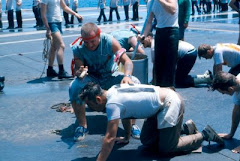



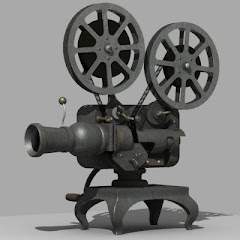
.jpg)

